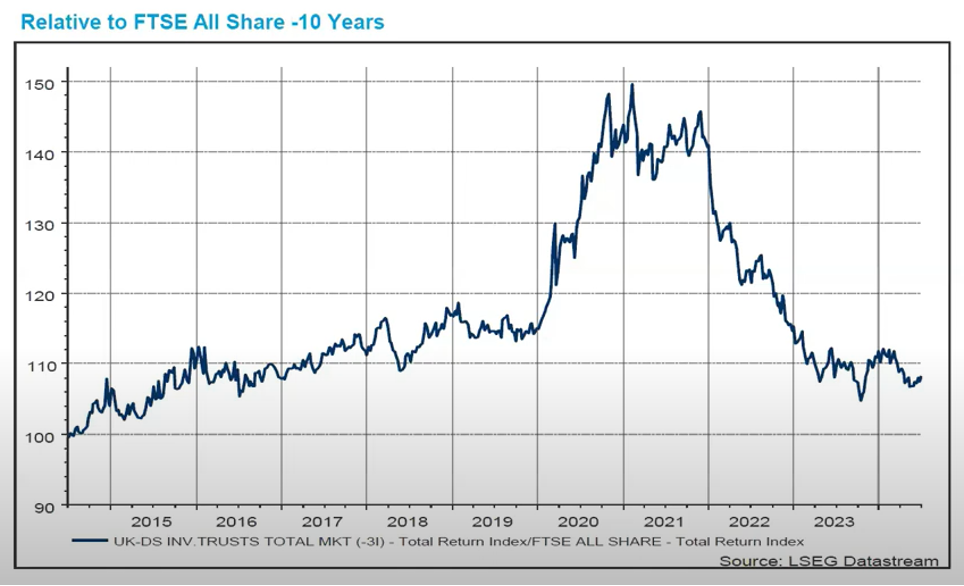Fund Battle: the managers who hunt for investment trust bargains
Faith Glasgow explains the approaches of three professional investors who specialise in buying investment trusts.
9th September 2024 12:06

For much of the past decade, investment trust investors were well rewarded relative to those investing in the broader UK stock market through, say, a FTSE All Share tracker or ETF.
At the zenith of its performance in 2021, the closed-ended fund universe had gained 50% on the broader market since mid-2014, as the graph below shows.
- Invest with ii: Buy Investment Trusts | Top UK Shares | What is a Managed ISA?

Past performance is not a guide to future performance.
But since then, rising inflation and interest rates have hit trusts hard and most of that outperformance has been lost.
Investment trusts’ share price discounts to the net values of their underlying assets (the NAV) opened up dramatically in 2022, and there has been little sign so far of any sustained tightening of discounts.
However, as interest rates start to fall, the economy strengthens and sentiment towards investment trusts improves, the expectation is that that trend will start to take hold, giving trust returns an added boost.
For investors who like the idea of access to investment trusts in order to take advantage of diversity and the current opportunities, but would rather have a professional investment trust expert selecting and managing the portfolio, there are three obvious ready-made funds of trusts to choose from.
Two – MIGO Opportunities Trust Ord (LSE:MIGO) and CT Global Managed Portfolio Growth Ord (LSE:CMPG) – are themselves structured investors, while Unicorn Mastertrust, is an open-ended fund.
- The investment trust bargains this pro is backing
- Sign up to our free newsletter for investment ideas, latest news and award-winning analysis
In the latest article in our Fund Battle series, we look at each one in turn, focusing on their portfolios, performance and how they’re run in order to help investors identify the best for their circumstances. We’ll also ask the important question: are there comparable alternatives worth considering?
How have the three funds performed?
As mentioned, the past few years have been a tough time for investment trusts in general. By extension, this trio of portfolios that invest in investment trusts have by extension suffered.
Perhaps unsurprisingly, over three, five and 10 years all have underperformed a comparator Vanguard LifeStrategy 80% Equity fund, according to data from interactive investor.
“This followed relative outperformance for the two managed trusts – for CMPG in 2020 and MIGO in 2021 – with 2020 and 2021 being broadly strong periods for investment trusts,” adds interactive investor analyst Alex Watts.
In particular 2022 was a bloodbath for the sector. “CMPG in 2022 saw large detraction from growth-focused trusts where discounts widened - Scottish Mortgage Ord (LSE:SMT), Allianz Technology Trust Ord (LSE:ATT), Monks Ord (LSE:MNKS),” Watts explains.
“MIGO has exposures to small alternative trusts, such as Baker Steel Resources Ord (LSE:BSRT), EPE Special Opportunities Ord (LSE:ESO), which fell to notable discounts, detracting from returns.
“For Unicorn, which allocates heavily to more mainstream small-cap trusts, allocations to trusts such as BlackRock Throgmorton Trust Ord (LSE:THRG), Henderson Smaller Companies Ord (LSE:HSL) and Herald Ord (LSE:HRI) dented returns in the year.”
However, signs of a turning tide for investment trusts are reflected in the shorter-term performance figures.
Over one year to the end of July 2024, all three outperformed the LifeStrategy 80% Equity fund, achieving double-digit total returns; CMPG and Unicorn Mastertrust also beat the higher-octane Vanguard LifeStrategy 100% Equity variant.
If interest rates continue to decline gradually and the economic outlook strengthens under the new Labour government, demand for investment trusts should pick up, strengthening their share prices and helping all three funds maintain that competitive edge.
How is each fund managed?
These three funds may sound on first impressions like variations on a common theme, but the reality - underscored by differences in recent performance – is that each is run quite distinctively.
MIGO, under the long-term stewardship of Nick Greenwood and Charlotte Cuthbertson, has followed a consistent strategy for many years.
- Watch our video: why City of London has boosted banks to 20-year high
- Pros’ top reasons to be fearful and cheerful for rest of 2024
Andrew McHattie, publisher of the Investment Trust Newsletter, explains the aim is to capitalise on discount opportunities among smaller, overlooked trusts in “the second or third rank” of the closed-ended universe.
“It aims very much at the punchier end of the investment companies sector, often seeking out more esoteric trusts that may not be on the radar for many investors,” he adds.
That makes it an interesting potential complement to more mainstream equity-focused trust holdings.
McHattie points to examples such as Georgia Capital (LSE:CGEO), Aquila European Renewables Ord (LSE:AERI) and Phoenix Spree Deutschland Ord (LSE:PSDL), which tend to fly under the radar.
The top five holdings include single-country specialist VinaCapital Vietnam Opp Fund Ord (LSE:VOF), Baker Steel Resources and focused private equity trust Oakley Capital Investments Ord (LSE:OCI).
However, this concentration on small alternative trusts has cost MIGO heavily in the past difficult couple of years, as such trusts were particularly hard hit by negative sentiment.
The average discount on MIGO’s top 10 holdings at the end of June stood at a hefty 32%. But that’s an exciting position as far as the managers are concerned, given the prospect of improving sentiment. They have recently been putting their money where their optimism is, moving from net cash into a 6% geared position.
McHattie adds that mergers and acquisitions are a big driver in this part of the market; the first half of 2024 alone saw a record six mergers, and Greenwood and Cuthbertson expect the uptick in M&A activity to continue.
CT Global Managed Portfolio takes a less niche and more diversified approach, with much greater use of UK and global equity trusts.
It also offers an attractive twist on the changing needs of private investors, through an unusual two-portfolio structure. Investors can invest in either the growth or the income option, and can switch periodically from one to the other as their needs change.
The income portfolio is inherently quite conservative and makes use of familiar equity heavyweights such as Law Debenture Corporation Ord (LSE:LWDB), JPMorgan Global Growth & Income Ord (LSE:JGGI) and Murray International Ord (LSE:MYI).
In the growth option, manager Peter Hewitt has introduced more private equity and technology in the shape of top five holdings such as HgCapital Trust Ord (LSE:HGT), Polar Capital Technology Ord (LSE:PCT) and Allianz Technology.
He is also optimistic on the outlook for UK-focused trusts in the wake of the general election, given the cheapness of the domestic market – especially small and mid-caps.
“Again, though, there are no wild bets or large exposures of more than 5% of assets,” stresses McHattie. “Hewitt is a careful, professional investor whom we regard as a safe pair of hands.”
- Eight bargain shares to replace the GRANOLAS
- Funds light on ‘Magnificent Seven’ that have delivered top returns
If you’re looking for an off-the-shelf core investment trust portfolio, then, this would be a natural choice, although any uplift from narrowing discounts is arguably likely to be less pronounced than for the other two funds.
Importantly, neither MIGO nor CMPG has suffered big swings in its own discounts through recent years – so that has not been a major factor in underperformance. The current discounts, as at 28 August, are -2.9% and -2.8% respectively.
Unicorn Mastertrust, as an open-ended fund, has no direct discount handicap to worry about, although widening discounts for its portfolio holdings have, of course, impacted performance.
That’s reflected in its outperformance versus its two peers over the past year, as markets have strengthened but investment trusts have remained out of favour. As at 28 August, over one year Unicorn Mastertrust is up 20.7%, versus 15.8% for CMPG and 11.8% for MIGO.
Manager Peter Walls, another investment trust veteran, has positioned the portfolio to take full advantage of the recovering smaller-cap and private equity sectors, with its top five holdings including private equity focused Oakley and HarbourVest Global Priv Equity Ord (LSE:HVPE), as well as Herald and Rockwood Strategic Ord (LSE:RKW), both smaller companies trusts.
It is the only option for those investors seeking a portfolio of interesting investment trusts but reluctant to invest directly in the investment trust structure.
Are there alternatives?
MIGO and Unicorn Mastertrust could be useful as a one-stop shop for exposure to more specialist and non-equity trusts; CMPG is designed as a broad core holding to stay the course as investors’ income needs change.
These funds provide diversity and access to interesting and specialist parts of the market, as well as aiming to reap the benefits as and when discounts narrow.
For those who are primarily interested in equities but prefer the idea of active management, the global equity behemoth Alliance Trust Ord (LSE:ATST) employs a multi-manager approach to run its billions.
Managed by Willis Towers Watkins, ATST uses a stable of around 10 specialist but very diverse managers, each overseeing a concentrated portfolio of their best ideas.
The approach has worked well since the manager took the reins in April 2017, with a cumulative share price return of 60% over the five years to the end of July and a low ongoing charge of 0.62%.
In contrast, MIGO returned 36%, CMPG 25% and Unicorn Mastertrust 32% over that period, and all have ongoing charges upwards of 1.5%.
These articles are provided for information purposes only. Occasionally, an opinion about whether to buy or sell a specific investment may be provided by third parties. The content is not intended to be a personal recommendation to buy or sell any financial instrument or product, or to adopt any investment strategy as it is not provided based on an assessment of your investing knowledge and experience, your financial situation or your investment objectives. The value of your investments, and the income derived from them, may go down as well as up. You may not get back all the money that you invest. The investments referred to in this article may not be suitable for all investors, and if in doubt, an investor should seek advice from a qualified investment adviser.
Full performance can be found on the company or index summary page on the interactive investor website. Simply click on the company's or index name highlighted in the article.
Editor's Picks